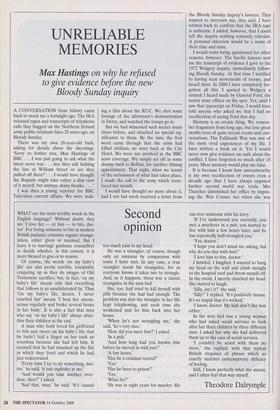Second opinion
WHAT are the most terrible words in the English language? Without doubt, they are 'I love her — or him — to bits, doc- tor'. For loving someone to bits in modern British parlance connotes regular strangu- lation, either given or received. But I leave it to marriage guidance counsellors to decide whether, in this context, it is more blessed to give or to receive.
Of course, the words 'on my baby's life' are also pretty terrible, irresistibly conjuring up as they do images of Old Testament sacrifice; but, in fact, 'on my baby's life' means only that everything that follows is an unadulterated lie. Thus `On my baby's life, doctor, I never touched her' means 'I beat her uncon- scious regularly and broke several bones in her body'. It is also a fact that men who say 'on my baby's life' always aban- don their children in the end.
A man who both loved his girlfriend to bits and swore on his baby's life that he hadn't laid a finger on her took an overdose because she had left him. It seemed that he had smashed up the flat in which they lived and which he had just redecorated.
`Every time I try to do something, doc- tor,' he said, 'it just explodes at me.'
`And would you take another over- dose, then?' I asked.
`Sod that, man,' he said. 'It's caused too much pain in my head.'
He was a strangler, of course, though only an amateur by comparison with some I have met. In any case, a true strangler needs his strangulee, for as everyone knows it takes two to strangle. And, as it happens, there was a classic strangulee in the next bed.
She, too, had tried to kill herself with pills because she had had enough. The problem was that the strangler in her life kept telephoning, and each time she weakened and let him back into her house.
`When he's not strangling me,' she said, 'he's very nice.'
`How did you meet him?' I asked.
`In a pub.'
`And how long had you known him before he moved in with you?'
`A few hours.'
`Has he a criminal record?'
`Yes.'
`Has he been to prison?'
`Yes.'
What for?'
`He was in eight years for murder. He ran over someone with his lorry.'
`If I've understood you correctly, you met a murderer in a pub, you started to live with him a few hours later, and he has repeatedly half-strangled you.'
`Yes, doctor.'
`I hope you don't mind me asking, but why do you stay with him?'
`I love him to bits, doctor.'
I howled. I laughed. I wanted to bang my head on the wall and climb straight to the hospital roof and throw myself off. In the event, I merely clutched my head. She started to laugh.
`Silly, isn't it?' she said.
`Silly?' I replied. 'It's positively insane. It's so stupid that it's wicked.'
I know, doctor. My kids don't like him either.'
In the next bed was a young woman who had asked social services to look after her three children by three different men. I asked her why she had delivered them up to the care of social services.
`I couldn't be arsed with them no more,' she replied, with that typical British elegance of phrase which so exactly matches contemporary delicacy of feeling.
Still, I know perfectly what she meant, and I often feel that way myself.
Theodore Dalrymple


















































































 Previous page
Previous page